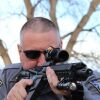Cops don’t go to neighborhood barbecues. At least, we don’t really like to. Between the tired jokes, the stories of someone being wrongly cited or the possibility of seeing someone you’ve encountered at work, it’s safer to just stay home. That social isolationism also keeps us from seeking training outside the mandatory requirements of work. The resulting lack of intellectual diversity stunts our growth as cops and as organizations.
Institutional Inertia
There’s an old saying describing cop shops as decades of tradition unhampered by progress. It’s tragically accurate. SWAT tends to be pretty good about sharing techniques with each other, but the majority of law enforcement suffers from institutional inertia. One cause of this phenomenon is our insular nature as referenced above. There are a lot of theories as to its origin, but the most logical is that cops are accustomed to being in control. Losing control of a situation at our job can have the direst of consequences. Turning that precious control over to someone else, e.g., a non-sworn instructor, is challenging and uncomfortable. I encourage you to push through that emotional roadblock and experience new ideas from the private training community.
Topics
Private firearms trainers teach skills and techniques that cops need but don’t get internally. For example, how many cops get trained in the proper use of concealment and plain clothes holsters? What about advanced studies of criminal behavior and deadly force? Those are important classes. However, they are minutia compared to the monumental amount of information that must be imparted by training divisions and police academies just to meet minimum standards in a finite amount of time. An added benefit for instructors is the ability to bring those ideas and skills back to your department.
Who Will Be There?
In the law enforcement culture, training is often considered an obligation rather than an opportunity. Too often I hear, “I don’t need to go to that class. I have my training hours for the year.” Obviously, we shouldn’t just attend classes to meet the state’s minimum standards or to get a certification. People who pay to attend private firearms training have a better perspective and are more receptive students. Also, I’ve noticed that financially investing in learning has helped me become a better student in my cop classes as well. As a bonus, I’ve learned as much from my classmates in private training as I have from the instructors and have also made some life-long friends who are not cops along the way. It’s been a good reminder that there is more to life than this career.
Toys
Private training companies have equipment that cop shops often do not. I attended a class on maximizing long-range rifle optics. The trainer brought several rifle/scope setups worth several thousand dollars each. That was quite a treat for a firearms aficionado. Force-on-force marking pistols, live-fire simulators or vehicles that can be shot at or from are also a rare treat for cops. I’ve done all of those things in private training classes. What’s more enticing than playing with someone else’s expensive toys?
Reach out
None of us will be in law enforcement forever. Too many career cops retire and struggle with the loss of comradery and a feeling of irrelevance. In anticipation of my own exfil, I searched for and found those things in teaching and taking classes. And while you’re escaping the bonds of your cozy comfort zone, go to the next neighborhood barbecue. You might be surprised what you’ve been missing.



